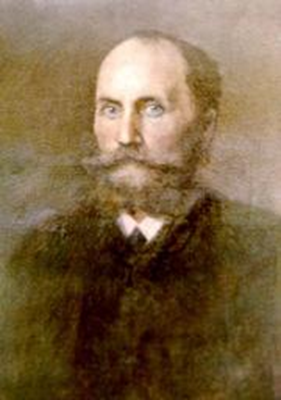Klages and synchronicity
Ludwig Klages (1872-1956). The following anecdote shows that Klages
combines a sharp intuition of what he calls genius loci – the guardian
spirit of a specific location – with an overall premonition of imminent threat.
 Needless to say that Klages’ sensitivity to imminent threat pervades his entire
philosophy (which is strongly inspired by environmental concerns and worries
about the increasing agony of nature). Biographically, this sensitivity seems
to have densified in 1910, during a short visit to a city park in Vienna with
his host, a local friend who had invited him to his house. During the walk, Klages
suddenly hears the vibrating strings of an Aeolian harp that had been hung in
the trees. He responds to the sound by spontaneously quoting two lines from the
Romantic German poet Nikolaus Lenau:
Needless to say that Klages’ sensitivity to imminent threat pervades his entire
philosophy (which is strongly inspired by environmental concerns and worries
about the increasing agony of nature). Biographically, this sensitivity seems
to have densified in 1910, during a short visit to a city park in Vienna with
his host, a local friend who had invited him to his house. During the walk, Klages
suddenly hears the vibrating strings of an Aeolian harp that had been hung in
the trees. He responds to the sound by spontaneously quoting two lines from the
Romantic German poet Nikolaus Lenau:
“Wie auf dem Lager sich der Seelenkranke,
So wirft im
Wind der Strauch sich hin und her.”

 His amazed host, whose wife happened
to be severely ill at the time, informs Klages that in 1850, Lenau had died insane
in the mental asylum neighbouring their park. There was even a commemorative
plaquette. Klages showed himself just as amazed as his host, as he was fully unaware
of the proximity of this mental asylum; moreover, he had not read Lenau for a
long time. Relating this event many years after, Klages adds
the following testimony:
His amazed host, whose wife happened
to be severely ill at the time, informs Klages that in 1850, Lenau had died insane
in the mental asylum neighbouring their park. There was even a commemorative
plaquette. Klages showed himself just as amazed as his host, as he was fully unaware
of the proximity of this mental asylum; moreover, he had not read Lenau for a
long time. Relating this event many years after, Klages adds
the following testimony:
“Inbezug
auf das kommende Geschick der Völker und der Menschheit habe ich nie geirrt,
inbezug auf Einzelcharaktere oft, und vollends Vorgesichte und Ahnungen sind
mir gänzlich versagt. Die Realität des genius loci aber hat sich mir
mehr als ein Mal offenbart.” Nevertheless, Klages mildly concludes, “[g]leichwohl möchte ich die
Sache für Zufall halten.”[1]
[1] Hans Eggert Schröder (1996, 1972). Ludwig Klages. Die Geschichte seines Lebens. Das Werk I (1905-1920). Bonn: Bouvier Verlag, p. 501. Cf “Was den Organisten
betrifft, der Euch draußen in dem Park schauerliche Chorale vorgespielt hat, so
ist das niemand anders gewesen, als der Nachtwind, der durch die Lüfte brausend
daherfuhr, und vor dem die Saiten der Wetterharfe erklangen. Ja ja, Kreisler,
die Wetterharfe habt Ihr vergessen, die zwischen den beiden Pavillons am Ende
des Parks aufgespannt ist.” E.T.A. Hoffmann (2006). Lebens-Ansichten des
Katers Murr. Düsseldorf: Artemis & Winkler, p.
183.



Reacties
Een reactie posten